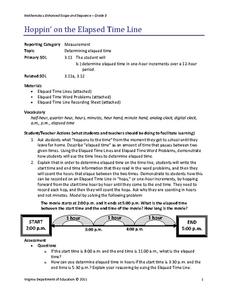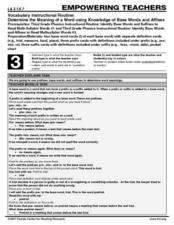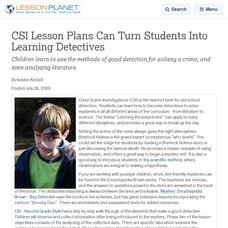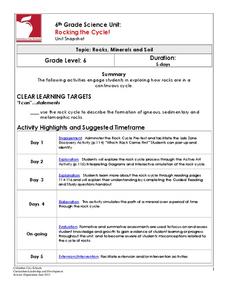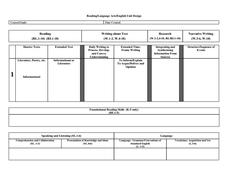Curated OER
Math: Heads or Tails
Seventh graders discover the difference between theoretical and experimental probabilities by designing their own problems and testing them. After conducting their own coin toss trial, they compare their results with an Internet...
Virginia Department of Education
Brainstorming to Write a Persuasive Essay on Demand
Equip your high school writers for the rigors of timed persuasive writing by employing the preparatory ideas available in this exercise. Learners use persuasive essays, provided by the educator, to acquire how to identify persuasive...
Virginia Department of Education
Hoppin' on the Elapsed Time Line
Time flies when you're teaching math! Okay, maybe not for everyone, but this lesson will have your young mathematicians calculating elapsed time before you know it.
Curated OER
Determine the Meaning of a Word Using Knowledge of Base Words and Affixes
Affixes can change the entire meaning of a word! Pupils practice with three prefixes and three suffixes in this scaffolded word meaning resource. There are affix cards here you can display in a pocket chart as you review. Learners first...
Virginia Department of Education
Scientifically Speaking
Explore the connection between operations with scientific notation and the laws of exponents. Scholars work on a set of word problems involving operations with scientific notation. Along the way, they consider how the laws of exponents...
Curated OER
Mathematics Within: Algebraic Processes and Its Connections to Geometry
Students analyze multiple strategies of multiplication: clustering, area model, breaking apart/decomposing, etc. They create their own strategies to approaching multiplication problems and share them with their classmates. Discussion...
Curated OER
History of Natural Resources in the U.S.
Students define conservation, exploitation and preservation, identify legislation related to conservation and environmental issues, and identify leaders and organizations that were key to the conservation and environmental movements.
Curated OER
WaterWeb
In this water worksheet, students answer 10 multiple-choice questions about the water cycle. Students also describe how they think their community is involved in sustaining water resources and write a pretend radio announcement about...
Curated OER
CSI Lesson Plans Can Turn Students Into Learning Detectives
Children learn to use the methods of good detection for solving a crime, and even analyzing literature.
Curated OER
Introducing Multiplication
Learners will look at repeating addition examples and view how they can be written as multiplication. They use manipulatives to complete a repeating addition lesson and show it on graph paper. They also chart what they have found and...
Curated OER
The Importance of Making Labs a Priority
The benefits of inquiry-based exploration can be attained in any classroom.
American Chemical Society
Surface Tension
A drop of dew holds a sphere shape even when sitting on a seat thanks to the surface tension of water. Learners observe the phenomena of surface tension in water. Through demonstrations, hands-on activities, and discussions they explore...
Curated OER
Maus: Cubing Questioning Strategy
Maus is the text for a postreading activity that has class members using a cubing strategy to analyze, in depth, topics (racism, past and present, forgetting/remembering the Holocaust, representing the Holocaust) associated with Art...
Curated OER
Pharmaceuticals and Treatments
Students perform an experiment involving reverse transcriptase-polymerized chain reaction HIV replication to better examine the biotechnology used by scientists in pharmaceutical research of infections diseases like HIV. Students examine...
Columbus City Schools
Rocking the Cycle!
Time to rock out! Discover the "life" cycle of the average rock using an illustrative stations lab and stimulating pairs game. Roll the dice to determine your fate: will it be melting in magma or chilling out to form igneous rock? The...
American Chemical Society
Can Liquids Dissolve in Water?
How does food coloring work? Classes watch a demonstration showing liquids dissolving in liquids. In groups, they then explore the ability of other liquids to dissolve in water (alcohol, mineral oil, and corn syrup) by setting up and...
Achievement Strategies
CCSS Unit Design Template for English/Language Arts K-12
Whether or not your school has adopted the Common Core standards, this 18-page language arts unit design template is worth a look because it asks instructors to consider all the key elements of a strong English language arts unit. In...
Columbus City Schools
Thinking Like A Soil Scientist
Ready to roll up those sleeves and get your hands dirty? Dirty with soil science content, that is! Overcome those "But it's just dirt" objections with a trip outside to collect soil samples for some in-class analysis. Use the variety of...
Cornell University
Beam Focusing Using Lenses
Explore optics using an inquiry-based experimental approach! Young scholars use a set of materials to design and build a unit capable of focusing a beam of light. They experiment with different lenses to determine the best approach to...
Missouri Department of Elementary
The Successful Student: What's Your Style?
Everyone is different, and they learn differently, too. After discussing what it is to be a good student, class members participate in the next lesson plan that explores their individual learning styles.
Book Units Teacher
Skill Lessons – Prefixes and Suffixes
Sometimes the best way to understand a concept is to break it down. Young vocabulary pupils work with word parts in a hands-on activity that prompts them to connect flash cards with affixes to their root and base words. Additionally,...
Achievement Strategies
Unit/Chapter Design Template
A thorough lesson plan template allows teachers to design balanced and standards-based lessons for any grade. The template includes spaces for unit vocabulary and concepts, objectives, and additional resources.
Columbus City Schools
The Mystery of Earth’s History
Every living creature can leave a fossil record, yet most fossils belong to extinct organisms rather than ones currently living. Scholars learn about dating rock layers, fossils, and the environment of the past. Pupils understand that...
Curated OER
My Antonia: Bloom’s Taxonomy Questions
How well do your pupils know My Antonia by Willa Cather? Take some time to create questions about the text. After examining a teacher model, individuals write questions that match each level of Bloom's Taxonomy and draft answers to these...




